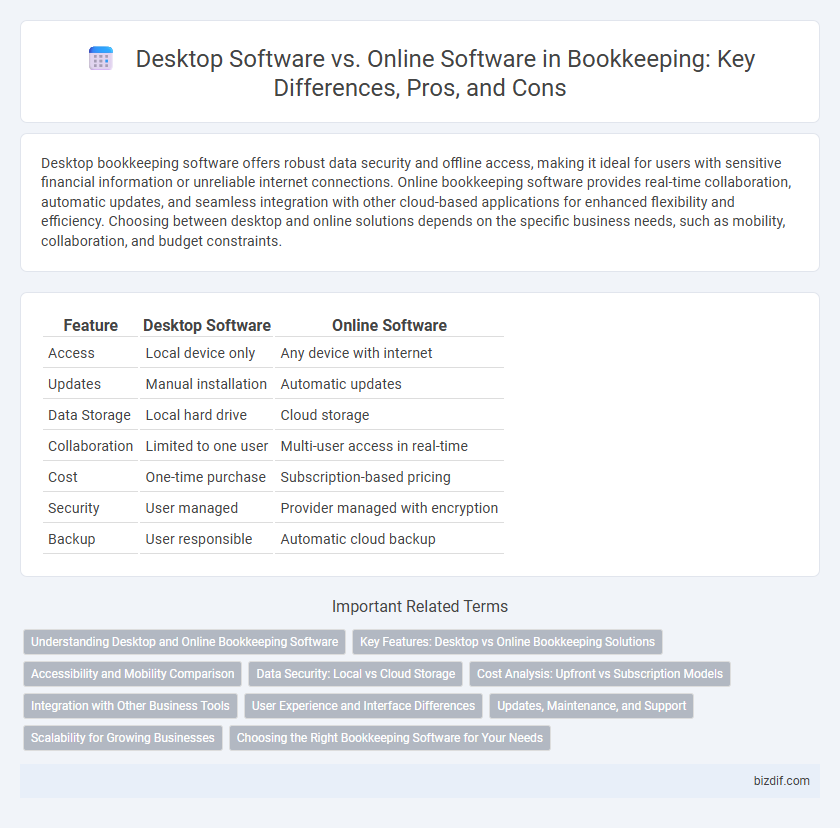Desktop bookkeeping software offers robust data security and offline access, making it ideal for users with sensitive financial information or unreliable internet connections. Online bookkeeping software provides real-time collaboration, automatic updates, and seamless integration with other cloud-based applications for enhanced flexibility and efficiency. Choosing between desktop and online solutions depends on the specific business needs, such as mobility, collaboration, and budget constraints.
Table of Comparison
| Feature | Desktop Software | Online Software |
|---|---|---|
| Access | Local device only | Any device with internet |
| Updates | Manual installation | Automatic updates |
| Data Storage | Local hard drive | Cloud storage |
| Collaboration | Limited to one user | Multi-user access in real-time |
| Cost | One-time purchase | Subscription-based pricing |
| Security | User managed | Provider managed with encryption |
| Backup | User responsible | Automatic cloud backup |
Understanding Desktop and Online Bookkeeping Software
Desktop bookkeeping software offers robust data control by storing financial records locally on a user's computer, ensuring enhanced security and offline accessibility. Online bookkeeping software enables real-time collaboration and automatic updates through cloud-based access, facilitating seamless integration with other financial tools and remote work flexibility. Choosing between desktop and online solutions depends on the business's specific needs for data control, accessibility, and collaboration features.
Key Features: Desktop vs Online Bookkeeping Solutions
Desktop bookkeeping software provides robust data security by storing information locally, offering faster processing speeds and offline access, ideal for businesses with limited internet connectivity. Online bookkeeping solutions enable real-time collaboration, automatic updates, and cloud backups, ensuring data accessibility from any device with internet access. Key features such as multi-user access, integration with other cloud services, and seamless data synchronization differentiate online software from traditional desktop applications.
Accessibility and Mobility Comparison
Desktop bookkeeping software offers robust features but limits accessibility to specific devices, restricting mobility for users who need to access financial data on the go. Online bookkeeping software provides seamless cloud-based access, enabling real-time updates and financial management from any internet-enabled device, enhancing flexibility and collaboration. This mobility advantage makes online solutions ideal for businesses with remote teams or frequent travel requirements.
Data Security: Local vs Cloud Storage
Desktop bookkeeping software stores data locally on a user's computer, reducing risks associated with internet breaches but increasing vulnerability to hardware failures and limited backup options. Online bookkeeping software leverages cloud storage with advanced encryption protocols, offering robust data protection, regular automatic backups, and real-time access across multiple devices. Businesses must weigh the control and security of local storage against the scalability and remote accessibility provided by cloud-based solutions.
Cost Analysis: Upfront vs Subscription Models
Desktop bookkeeping software typically involves a one-time upfront purchase cost, which can be more economical for businesses with limited ongoing budgets. Online bookkeeping solutions operate on a subscription model, often requiring monthly or annual fees that cover updates and cloud services, offering scalability and continuous support. Cost analysis should consider the total cost of ownership, including software updates, data storage, and potential scalability needs over time.
Integration with Other Business Tools
Desktop bookkeeping software typically offers limited integration capabilities, often requiring manual data imports and exports with other business tools, which can slow down workflow efficiency. Online bookkeeping software provides seamless integration with a wide range of business applications such as CRM systems, payroll services, and inventory management platforms, enabling real-time data synchronization and automation. The ability of cloud-based bookkeeping software to connect effortlessly with tools like QuickBooks, Xero, and Zapier enhances overall operational productivity and accuracy.
User Experience and Interface Differences
Desktop bookkeeping software offers a robust, feature-rich interface that operates smoothly without internet dependency, providing faster data processing and greater control over security settings. Online bookkeeping software prioritizes accessibility and real-time collaboration through intuitive, cloud-based interfaces that adapt seamlessly across multiple devices. User experience in desktop solutions emphasizes stability and offline functionality, while online platforms focus on convenience, automatic updates, and integration with other cloud services.
Updates, Maintenance, and Support
Desktop bookkeeping software requires manual updates and regular maintenance, often demanding user intervention for installation and system compatibility checks. Online bookkeeping software automatically updates in real-time, ensuring access to the latest features and security patches without user effort. Customer support for online platforms typically includes 24/7 availability and immediate troubleshooting, whereas desktop software support may involve scheduled service times and potential delays.
Scalability for Growing Businesses
Desktop bookkeeping software offers limited scalability as it requires manual updates and hardware upgrades, often constraining growing businesses with fixed processing power. Online bookkeeping software leverages cloud infrastructure, enabling seamless scaling of storage, user access, and integrations to accommodate expanding transaction volumes and team sizes. Cloud solutions also provide real-time data synchronization and automatic updates, ensuring businesses maintain agility and operational efficiency during growth phases.
Choosing the Right Bookkeeping Software for Your Needs
Choosing the right bookkeeping software depends on your business size, budget, and accessibility preferences. Desktop software offers robust data control and offline access, ideal for businesses with strict security needs or limited internet. Online software provides real-time collaboration, automatic updates, and cloud storage, making it suitable for remote teams and businesses seeking scalability.
Desktop software vs Online software Infographic

 bizdif.com
bizdif.com